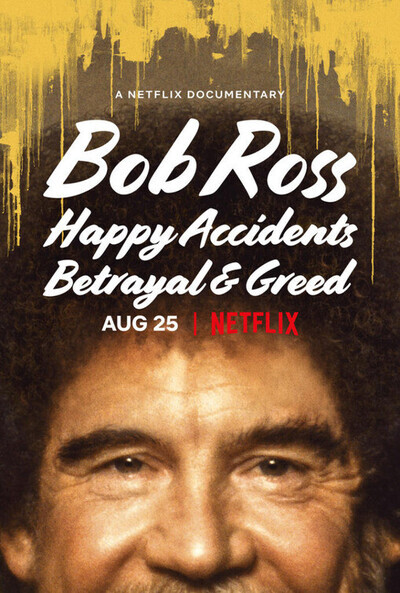
 College. The time to leave the watchful eye of your parents and become your own person. Many life-long friends and memories form in those four years. It was during those years that I found out how fulfilling watching a 30-minute PBS show about painting trees could be. A regular weekday afternoon would find my roommates and me enjoying The Joy of Painting (1983 – 1994) before heading back to class. Since then, I have always found Bob Ross interesting, wondering if he was the same man portrayed on television. So once Netflix released Bob Ross: Happy Accidents, Betrayal & Greed (2021), it became clear what I would be watching next.
College. The time to leave the watchful eye of your parents and become your own person. Many life-long friends and memories form in those four years. It was during those years that I found out how fulfilling watching a 30-minute PBS show about painting trees could be. A regular weekday afternoon would find my roommates and me enjoying The Joy of Painting (1983 – 1994) before heading back to class. Since then, I have always found Bob Ross interesting, wondering if he was the same man portrayed on television. So once Netflix released Bob Ross: Happy Accidents, Betrayal & Greed (2021), it became clear what I would be watching next.
With such a salacious title, one could assume that the documentary would contain all sorts of unknown details of Bob Ross’s life. Before all is revealed, however, director Joshua Rofé chose to focus on happier times. In the documentary, everyone who sits down to discuss Ross has positive things to say. The man that seemed so full of joy and happiness on television carried the same disposition in person. A former military man, Ross found peace in learning to paint. According to his first instructor, John Thamm, painting was a passion that came to Ross naturally.
It was this natural ability that made it possible for Ross to become an art instructor once he retired from the military. It was as an art instructor that Ross met the person who would have the biggest effect on his life from then on.
Annette Kowalski had taken one of Ross’s classes to try and overcome a personal tragedy. Kowalski brought Ross to meet her husband with the motive that all three would go into business together. Here is where the theme of Rofé’s documentary begins to shift toward the betrayal and greed promised in the title. The underhanded tactics of the Kowalskis, after they had helped Ross become a household name, are the focus of the second half of Bob Ross: Happy Accidents, Betrayal & Greed.
As most documentaries go, Bob Ross: Happy Accidents, Betrayal & Greed, is fairly pedestrian. We get the typical talking head interviews mixed with archived footage of the show and home videos. As with many documentaries, Rofé and his team received some pushback throughout filming. What is a bit unsettling is the number of people who backed out of being interviewed in light of potential threats from the Kowalskis — threats that seemed especially likely due to Walt Kowalski’s career in the CIA.
In the end, Rofé seemed to have two goals with Bob Ross: Happy Accidents, Betrayal, & Greed. The first goal was to paint Ross as a genuine person of whom many people are very fond. The stories that friends and family alike tell drive that point home. The other goal was to reveal that Ross’s family makes no money from any of the numerous products that bear his image. It is disheartening to learn that something that Ross fought to avoid ’til the day he died happened anyway. After watching the documentary, I question if I can support any Ross-related products. Perhaps because of Rofé‘s work, the Ross family can receive some financial windfall from the products.


![[REVIEW] I AM IRON MAN #1](https://geekd-out.com/wp-content/uploads/2023/02/i-am-iron-man-feat-150x150.jpg)

